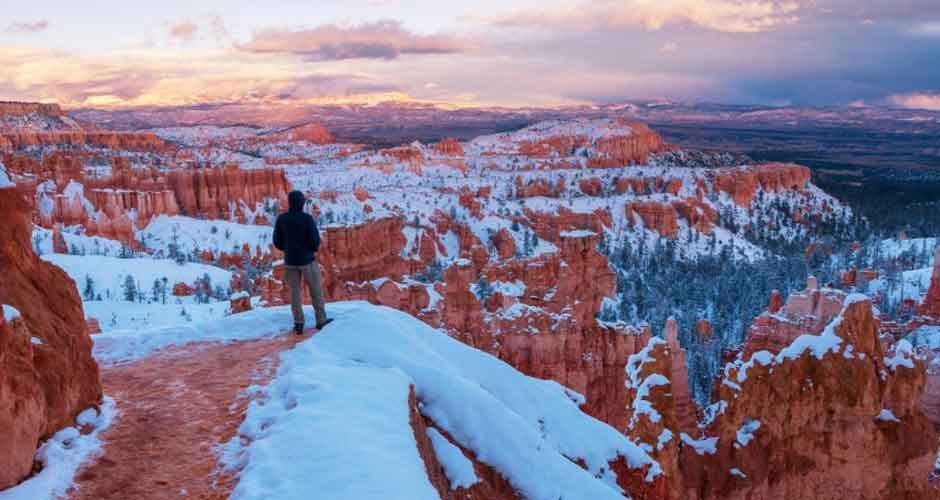Winter provides a magical and unique opportunity to explore nature. Although hiking in the winter is more complex and requires greater caution, it’s also an exciting experience with stunning views. This comprehensive guide offers essential tips to ensure your safety on cold-weather hiking.
Essential Tips for Beginner Hikers
Search For and Select Suitable Winter Trails
Plan your winter hike by researching and choosing trails suitable for winter conditions. Consider well-marked trails that are maintained regularly and are popular with winter hikers. Consider trail length, altitude gain, and accessibility. Finding winter-friendly hikes in your area can be found by searching for trails at state forests, national parks, or local hiking groups.
Dress in Layers & Wear Winter Gear
It is essential to dress appropriately for winter hiking. You can regulate your temperature by layering clothing. Add a moisture-wicking layer to your base layer. Then add an insulation layer in the middle. Finally, top it all off with waterproof and windproof outer layers. Don’t forget to use a warm cap, gloves, thermal socks, and insulated boots to protect your extremities. Keep snow out of your boot with gaiters.
Always Carry Essential Winter Gear
Winter hiking gear is different from everyday essentials. It’s vital to have battery heated blanket, extra gloves, hand and foot warmers, and socks to keep warm. For extreme weather or wetness, you may need to pack hand and foot warmers, extra gloves and socks.
As the daylight hours in winter are shorter, you should carry a flashlight or a headlamp. The list of essential items includes a map, GPS device, GPS compass and ice cleats/crampons that provide traction when walking on icy surfaces. Also, trekking poles will help you stay stable.
Hydrate And Nourish Your Body
In the cold, staying hydrated is crucial. Cold temperatures can lead to dehydration, so hydrate well when hiking. Liquids won’t freeze in insulated bottles or hydration bags. Keep your energy levels up by packing high-energy snack foods such as energy bars, dried fruits and nuts. Bring along a thermos full of warm beverages to provide a treat.
Get Winter Navigation and Safety Skills
Winter hiking involves additional skills and knowledge. Use a GPS device or compass to navigate in snowy weather conditions effectively. Know how to avoid and treat frostbite. Suppose you come across steep or slippery slopes, practice self-arrest techniques. Be prepared for sudden temperature changes and weather changes.
Start With Shorter Walks And Increase Difficulty Slowly
Start with shorter, less demanding hikes if winter hiking is new. It will help if you familiarize yourselves with the challenges and risks of winter hiking. Gradually increase your difficulty level as you gain experience and confidence.
Check Avalanche and Weather Conditions
Winter weather is unpredictable. Be sure to check weather conditions and avalanche dangers before setting out. Avoid hiking during storms with heavy snowfall or high winds. Know the signs of avalanche danger and how you can recognize it. If hiking in an avalanche-prone area, take a course on avalanche awareness.
Join a Winter Hiking Group
For beginners, hiking with other winter hikers with experience or joining a hiking club is recommended. Seasoned hiking experts can give valuable guidance and share their expertise to ensure your safety. It is also more fun to hike in a small group.
Frequently Asked Questions
What Type Of Footwear Should I Wear For Winter Hiking?
Wearing waterproof and insulated shoes is recommended for winter hiking. These boots are waterproof and provide insulation for your feet to keep them warm. They also prevent them from becoming wet when it is snowing or icy. To minimize the risk of falling, choose boots with a good grip.
What Essential Gear Should Beginner Hikers Carry When Hiking In Winter?
Winter hikes require that beginners carry several essential items. They include a map with a compass and extra batteries to use in low-visibility conditions, a headlamp for emergencies and an emergency blanket.
Can novice hikers in the cold use a battery-heated blanket?
A battery heated blanket may be helpful for novice hikers in the cold, yes. As an additional provider of comfort and convenience, it is available when taking breaks or when sleeping.
What Is The Importance Of Checking Weather Conditions For A Winter Walk?
Checking the weather conditions is crucial before embarking on a winter hiking trip. Winter weather conditions can be unpredictable. Sudden changes can present significant risks for hikers. If you look at the weather prediction before your walk, you may make appropriate plans and be ready for severe weather.
What Are The Benefits Of Telling Someone About Your Hiking Plans During Winter?
Informing someone about your winter hiking plan is vital for your safety. Someone knowing your itinerary is helpful if you face a difficult situation or an unexpected circumstance. The itinerary can be used as a security net if you fail to return when scheduled.
How Can Beginners Prepare For Shorter Daylight During Winter Hiking?
Beginners can prepare for shorter daylight times during winter hiking if they start early. Planning your route, pace and duration of the hike is essential. This will enable you to finish it before dusk. You should bring a headlamp in case the trek takes lengthier than anticipated or vision is compromised by bad weather.
Conclusion:
Winter hiking provides a unique opportunity to observe nature’s transformation as it transforms under a white blanket. Following these essential tips will help you to enjoy winter hiking and its challenges.
Always research and choose suitable trails. Wear layers, bring essential winter equipment, and master winter navigation. Stay hydrated, fed, and aware of weather conditions. Each winter hike will give you more experience and confidence. It will also help you to form a deeper relationship with the beautiful winter landscapes. Enjoy winter hiking and embrace the season!






